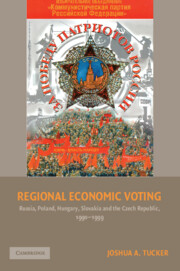Book contents
- Frontmatter
- Contents
- List of Tables
- Acknowledgments
- Party Acronyms and Candidate Abbreviations
- 1 INTRODUCTION
- 2 ECONOMIC CONDITIONS AND ELECTION RESULTS
- 3 COMPARATIVE CROSS-REGIONAL ANALYSIS
- 4 PAIRED CASE STUDIES
- 5 THE INCUMBENCY HYPOTHESIS
- 6 THE NEW REGIME HYPOTHESIS
- 7 THE OLD REGIME HYPOTHESIS
- 8 COMPARATIVE ANALYSIS
- 9 ECONOMIC VOTING AND POSTCOMMUNIST POLITICS
- Appendix I NATIONAL ELECTION RESULTS
- Appendix II REGRESSION RESULTS AND DOCUMENTATION
- Appendix III ESTIMATED DISTRIBUTIONS OF FIRST DIFFERENCES
- Appendix IV PERCENTAGE OF POSITIVE SIMULATIONS BY PARTY
- Works Cited
- Index
- Titles in the series
3 - COMPARATIVE CROSS-REGIONAL ANALYSIS
Published online by Cambridge University Press: 24 November 2009
- Frontmatter
- Contents
- List of Tables
- Acknowledgments
- Party Acronyms and Candidate Abbreviations
- 1 INTRODUCTION
- 2 ECONOMIC CONDITIONS AND ELECTION RESULTS
- 3 COMPARATIVE CROSS-REGIONAL ANALYSIS
- 4 PAIRED CASE STUDIES
- 5 THE INCUMBENCY HYPOTHESIS
- 6 THE NEW REGIME HYPOTHESIS
- 7 THE OLD REGIME HYPOTHESIS
- 8 COMPARATIVE ANALYSIS
- 9 ECONOMIC VOTING AND POSTCOMMUNIST POLITICS
- Appendix I NATIONAL ELECTION RESULTS
- Appendix II REGRESSION RESULTS AND DOCUMENTATION
- Appendix III ESTIMATED DISTRIBUTIONS OF FIRST DIFFERENCES
- Appendix IV PERCENTAGE OF POSITIVE SIMULATIONS BY PARTY
- Works Cited
- Index
- Titles in the series
Summary
The purpose of this chapter is twofold. In the first half of the chapter, I introduce the method of analysis that I use to assess the empirical support for the models and hypotheses presented in the previous chapter. Although no specific component of the analysis represents a new analytic technique or statistical tool, the manner in which they are combined here – and applied to the substantive questions at hand – is novel, and thus warrants a systematic explication of the method. In this vein, the second half of the chapter considers in greater detail the advantages and disadvantages of the method of analysis.
The aims of the method are fourfold. First, it is intended to facilitate a comparative analysis of the effect of economic conditions on election results across multiple cases; in other words, it is explicitly designed for comparative study. Second, the method of comparison is intended to be as transparent and easily replicable as possible; faced with the same data and statistical results, others should be able to come to similar conclusions about the relative empirical support for different hypotheses, or at the very least understand exactly why I have drawn the conclusions that I did. Third, the method is explicitly designed to treat seriously issues of comparability of data, an especially important issue in new democracies.
- Type
- Chapter
- Information
- Regional Economic VotingRussia, Poland, Hungary, Slovakia, and the Czech Republic, 1990–1999, pp. 78 - 125Publisher: Cambridge University PressPrint publication year: 2006



